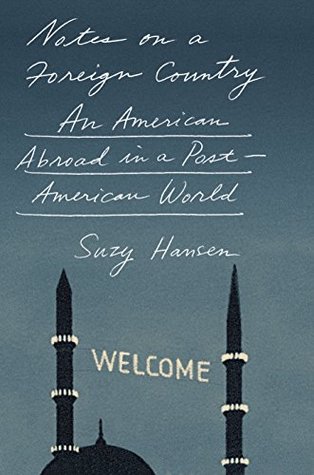More on this book
Community
Kindle Notes & Highlights
by
Suzy Hansen
Started reading
September 6, 2017
INTRODUCTION It is still not clear if the United States—a country formed in great measure by those who have themselves escaped vast catastrophes, famines, dictatorships, persecution—it is far from certain that the men and women of this nation so full of hope and tolerance, will be able to feel that same empathy towards the other outcast members of our species. —ARIEL DORFMAN
Maybe Baldwin knew white people would never understand him. But as Americans act out their despair in increasingly dangerous ways in the twenty-first century, Baldwin’s observations from the twentieth began to sound more and more prophetic: “This is the way people react to the loss of empire,” he once wrote, “for the loss of an empire also implies a radical revision of the individual identity.” So, my question: Who do we become if we don’t become Americans?
wars in Iraq and Afghanistan, and the many more wars that followed, it has become more difficult to gallivant across the world, absorbing its wisdom and resources for one’s own personal use. As an American abroad now, you do not have the same crazy, smiling confidence. You do not want to speak so loud. You feel always the vague risk of breaking something.
children of leftists, and who, like many of Rana’s generation, had been raised after the 1980 coup to stay out of politics. Their generation was liberal-minded but apolitical, obeying the dictates of a new capitalist economy that demanded large salaries to survive.
Somehow, though, because in Turkey the force that wanted to restrain Islam was the military, I could see that Westerners, too, were a people who wanted to change people’s lives by force. What was the Enlightenment, what was liberalism?
We in the West still seemed to believe the old story of how a man transformed an Islamic empire into a secular republic: Atatürk came along, changed some rules, the people followed. Old Turkish textbooks didn’t portray the suppression of Islam as anything other than a liberation. But I began to question for the first time what it was like to suddenly lose your language, your mode of dress, your idea of the world. My assumption had been that any social revolution that resulted in a country becoming more “modern,” in the American sense, must have been a good thing. In Turkey, not only had this
...more
Unjust societies tend to cloud the minds of those who live within them. Such societies hold themselves together not by force alone but by powerful imaginative structures that instill fear and complacency in the population. Those who, at least on the surface, profit from injustice tend to be brought up in ways that encourage insensitivity to the suffering on which their advantaged life depends. If we are inhabitants of an unjust social order, it is likely that our own possibilities for thought will be tainted by the injustice
ONCE YOU REALIZE that the way you have looked at the world—the way you viewed your country, your history, your life—has been muddled, you begin a process of shedding layers of skin. It’s a slow process, you break down, you open up, but you also resist, much like how the body can begin to heal, only to
treating foreign countries as if they were America’s misbehaving children.
Secularism is our only weapon in the Middle East. We’re the only secular republic in the Middle East! But we’re always under the dollars of the American state.
Republican eras. We are the only group that’s feverishly holding on to secularism and the Republic. Then America started with NATO, other international treaties, and slowly but surely Turkey became a strategic partner—the most dangerous thing in the world to me. And dollars came in. Commerce.”
The philosopher William James argued that all humans suffer from a blindness toward those who are different from them; it would forever be impossible for man, he warned, to fully sympathize with the “Other.” But the Americans, as they had from the beginning, had reason to believe in their own unique abilities to bring civilization to the uncivilized. As Christians they possessed a messianic faith in the purpose of their Promised Land to guide the rest of the world to heaven.


